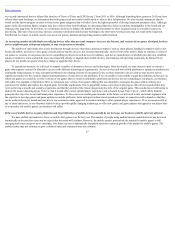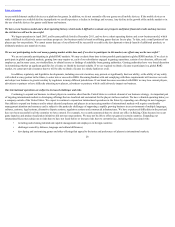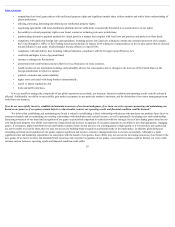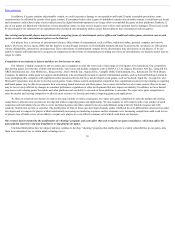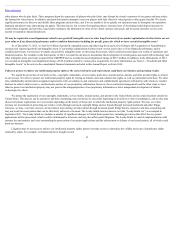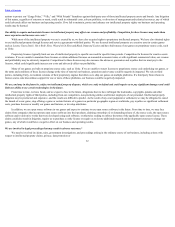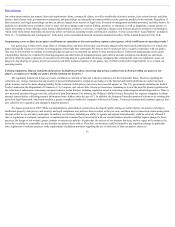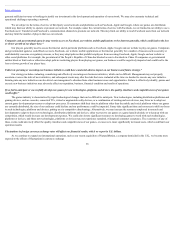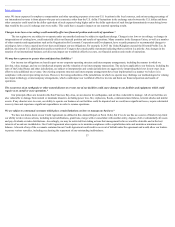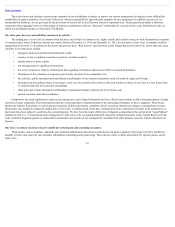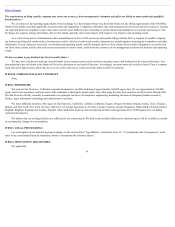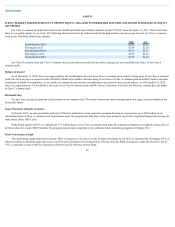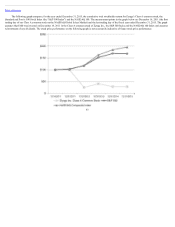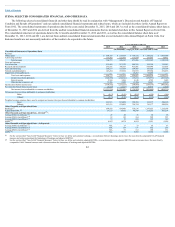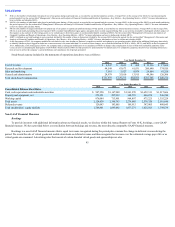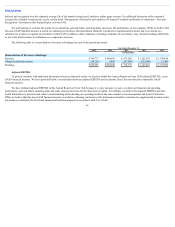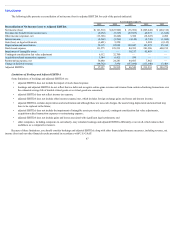Zynga 2015 Annual Report Download - page 40
Download and view the complete annual report
Please find page 40 of the 2015 Zynga annual report below. You can navigate through the pages in the report by either clicking on the pages listed below, or by using the keyword search tool below to find specific information within the annual report.
Table of Contents
rates. We incur expenses for employee compensation and other operating expenses at our non-U.S. locations in the local currency, and an increasing percentage of
our international revenue is from players who pay us in currencies other than the U.S. dollar. Fluctuations in the exchange rates between the U.S. dollar and those
other currencies could result in the dollar equivalent of such expenses being higher and/or the dollar equivalent of such foreign-denominated revenue being lower
than would be the case if exchange rates were stable. This could have a negative impact on our reported operating results.
Changesintaxlawsortaxrulingscouldmateriallyaffectourfinancialpositionandresultsofoperations.*
The tax regimes we are subject to or operate under are unsettled and may be subject to significant change. Changes in tax laws or tax rulings, or changes in
interpretations of existing laws, could materially affect our financial position and results of operations. Many countries in the European Union, as well as a number
of other countries and organizations such as the Organization for Economic Cooperation and Development, have recently proposed or recommended changes to
existing tax laws or have enacted new laws that could impact our tax obligations. For example, in 2015 the United Kingdom enacted the Diverted Profits Tax. In
addition, the current U.S. administration and key members of Congress have made public statements indicating that tax reform is a priority. Any changes in the
taxation of our international business activities may impact our worldwide effective tax rate, our financial position and results of operations.
Wemayhaveexposuretogreaterthananticipatedtaxliabilities.*
Our income tax obligations are based in part on our corporate operating structure and intercompany arrangements, including the manner in which we
develop, value, manage, and use our intellectual property and the valuation of our intercompany transactions. The tax laws applicable to our business, including the
laws of the United States and other jurisdictions, are subject to interpretation and certain jurisdictions are aggressively interpreting their laws in new ways in an
effort to raise additional tax revenue. Our existing corporate structure and intercompany arrangements have been implemented in a manner we believe is in
compliance with current prevailing tax laws. However, the taxing authorities of the jurisdictions in which we operate may challenge our methodologies for valuing
developed technology or intercompany arrangements, which could impact our worldwide effective tax rate and harm our financial position and results of
operations.
Theoccurrenceofanearthquakeorothernaturaldisasteratornearoneofourfacilitiescouldcausedamagetoourfacilitiesandequipment,whichcould
requireustocurtailorceaseoperations.*
Our principal offices are located in the San Francisco Bay Area, an area known for earthquakes, and are thus vulnerable to damage. All of our facilities are
also vulnerable to damage from natural or manmade disasters, including power loss, fire, explosions, floods, communications failures, terrorist attacks and similar
events. If any disaster were to occur, our ability to operate our business at our facilities could be impaired and we could incur significant losses, require substantial
recovery time and experience significant expenditures in order to resume operations.
Wearesubjecttocontractualcovenantswhichplacecertainlimitationsonhowwemanageourbusiness.*
We have not drawn down on our Credit Agreement (as defined in this Annual Report on Form 10-K), but if we do use this as a source of funds it may limit
our ability to take various actions, including incur indebtedness, grant liens, merge with or consolidate with another entity, dispose of all or substantially all assets
and pay dividends or make distributions. Accordingly, we may be restricted from taking actions that management believes would be desirable and in the best
interests of us and our stockholders. Our Credit Agreement also requires us to maintain compliance with a capitalization ratio and maintain a minimum cash
balance. A breach of any of the covenants contained in our Credit Agreement could result in an event of default under the agreement and would allow our lenders
to pursue various remedies, including accelerating the repayment of any outstanding indebtedness.
37


